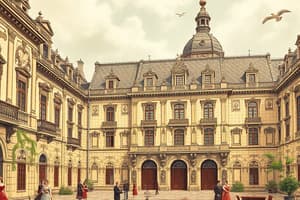Podcast
Questions and Answers
Which of the following best describes the composition of the Third Estate in pre-revolutionary France?
Which of the following best describes the composition of the Third Estate in pre-revolutionary France?
- Consisted mainly of the nobility and aristocratic families.
- Composed of royal advisors and government officials.
- Primarily members of the clergy and religious figures.
- Included the vast majority of the population, such as peasants and commoners. (correct)
Which of the following factors contributed to the outbreak of the French Revolution?
Which of the following factors contributed to the outbreak of the French Revolution?
- Widespread satisfaction with the existing social and political structure.
- Equitable distribution of wealth and resources among the estates.
- Strong economic prosperity and financial stability across all social classes.
- Enlightenment ideals advocating for social and political reform. (correct)
What was the significance of the Estates General in the lead-up to the French Revolution?
What was the significance of the Estates General in the lead-up to the French Revolution?
- It provided a platform for the estates to voice grievances and demand reforms. (correct)
- It effectively resolved the economic crisis and addressed the people's concerns.
- It solidified the king's absolute authority and control over the estates.
- It ensured fair representation and equal power for all three estates.
What was the Taille in pre-revolutionary France, and how did it contribute to the unrest?
What was the Taille in pre-revolutionary France, and how did it contribute to the unrest?
What was the Reign of Terror, and which group was primarily responsible for it?
What was the Reign of Terror, and which group was primarily responsible for it?
What was the main charge against King Louis XVI that led to his execution?
What was the main charge against King Louis XVI that led to his execution?
How did living conditions in pre-revolutionary France differ between the estates?
How did living conditions in pre-revolutionary France differ between the estates?
Which of the following was a significant consequence of the French Revolution?
Which of the following was a significant consequence of the French Revolution?
Flashcards
The Three Estates
The Three Estates
The classification of French society into three groups: clergy, nobility, and commoners.
Taille
Taille
A land tax that burdened the French common people, especially the Third Estate.
Estates General
Estates General
A representative assembly in France that included delegates from the three estates, convened in 1789.
Reign of Terror
Reign of Terror
Signup and view all the flashcards
Execution of King Louis XVI
Execution of King Louis XVI
Signup and view all the flashcards
Pre-Revolutionary Living Conditions
Pre-Revolutionary Living Conditions
Signup and view all the flashcards
Napoleon Bonaparte
Napoleon Bonaparte
Signup and view all the flashcards
Principles of the Revolution
Principles of the Revolution
Signup and view all the flashcards
Study Notes
The French Revolution: Causes, Events, and Consequences
- The French Revolution was a period of major political and social change in France
- It marked a challenge to the existing social order, seeking a more just and equitable society
The Three Estates
- French society was divided into three estates:
- First Estate: Clergy (Church members)
- Second Estate: Nobility
- Third Estate: Commoners (peasants, everyone else)
- The Third Estate comprised the vast majority of the population
Taxation and Unrest
- French citizens faced heavy taxation, particularly the land tax (Taille)
- This disproportionately burdened the Third Estate
- Growing dissatisfaction stemming from financial hardship and unequal treatment led to unrest
The Estates General
- The Estates General was a representative body (from all three Estates)
- It was convened by King Louis XVI in 1789 to address France's economic crisis
- Group representing all Estates for decision making
Causes of the French Revolution
- Bad Harvests and Rising Prices: Poor harvests led to widespread hardship and increased bread prices
- Desire for Social Change: The Third Estate demanded equality and an end to the privileges of the nobility and clergy
Events of the French Revolution
- Not detailed, but the text mentions events
The Reign of Terror
- The Jacobins (a radical group) seized power
- Instigated a violent period known as the Reign of Terror, severely punishing those opposing the revolution
Execution of King Louis XVI
- King Louis XVI was executed by the National Assembly in January 1793 for treason
Living Conditions Before the Revolution
- Significant disparities between the estates; nobility and clergy had privileges and exemptions from taxation
- Commoners faced heavy financial burdens and social inequality
Consequences of the Revolution
- The revolution led to far-reaching consequences, including the rise of Napoleon Bonaparte
- The establishment of a new order in France, abolishing the monarchy
- Principles of liberty, equality, and fraternity became central to the nation's identity
Studying That Suits You
Use AI to generate personalized quizzes and flashcards to suit your learning preferences.
Related Documents
Description
Explore the key events, and outcomes of this pivotal period in French history. Understand pre-revolution French society, the role of the Three Estates, and the impact of taxation. Learn about the transition from monarchy to republic, and the enduring legacy of liberty, equality, and fraternity.



